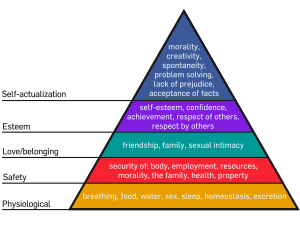Whereas behavioral learning theorists (e.g., Bandura, 1986; Skinner, 1953) speak in terms of motivation to obtain reinforcers and avoid punishers, other theorists (e.g., Maslow, 1954) prefer the concept of motivation to satisfy needs. Some basic needs that we all must satisfy are those for food, shelter, love, and maintenance of positive self-esteem. People differ in the degree of importance they attach to each of these needs. Some need constant reaffirmation that they are loved or appreciated; others have a greater need for physical comfort and security.
MASLOW’S HIERARCHY OF NEEDS :
Given that people have many needs, which will they try to satisfy at any given
 Image via Wikipedia
Image via Wikipediamoment? To predict this, Maslow (1954) proposed a hierarchy of need. In Maslow’s theory, needs that are lower in this hierarchy must be at least partially satisfied before a person will try to satisfy higher-level needs. For example, a hungry person or someone who is in physical danger will be less concerned about maintaining a positive self-image than about obtaining food or safety; but once that person is no longer hungry or afraid, self-esteem needs might become paramount. One critical concept that Maslow introduced is the distinction between deficiency needs and growth needs. Deficiency needs (physiological, safety, love, and esteem) are those that are critical to physical and psychological well-being; these needs must be satisfied, but once they are, a person’s motivation to satisfy them diminishes. In contrast, growth needs, such as the need to know and understand things, to appreciate beauty, or to grow and develop in appreciation of others, can never be satisfied completely. In fact, the more people are able to meet their need to know and understand the world around them, the greater their motivation might become to learn still more.
SELF-ACTUALIZATION:
Maslow’s theory includes the concept of desire for self-actualization which he defines as “the desire to become everything that one is capable of becoming” (Maslow, 1954, P. 92). Self-actualization is characterized by acceptance of self and others, spontaneity, openness, relatively deep but democratic relationships with others, creativity, humor, and independence-in essence, psychological health. Maslow places striving for self-actualization at the top of his hierarchy of needs, implying that achievement of this most important need depends on the satisfaction of all other needs.
Be the first to comment on "Motivation and human needs"